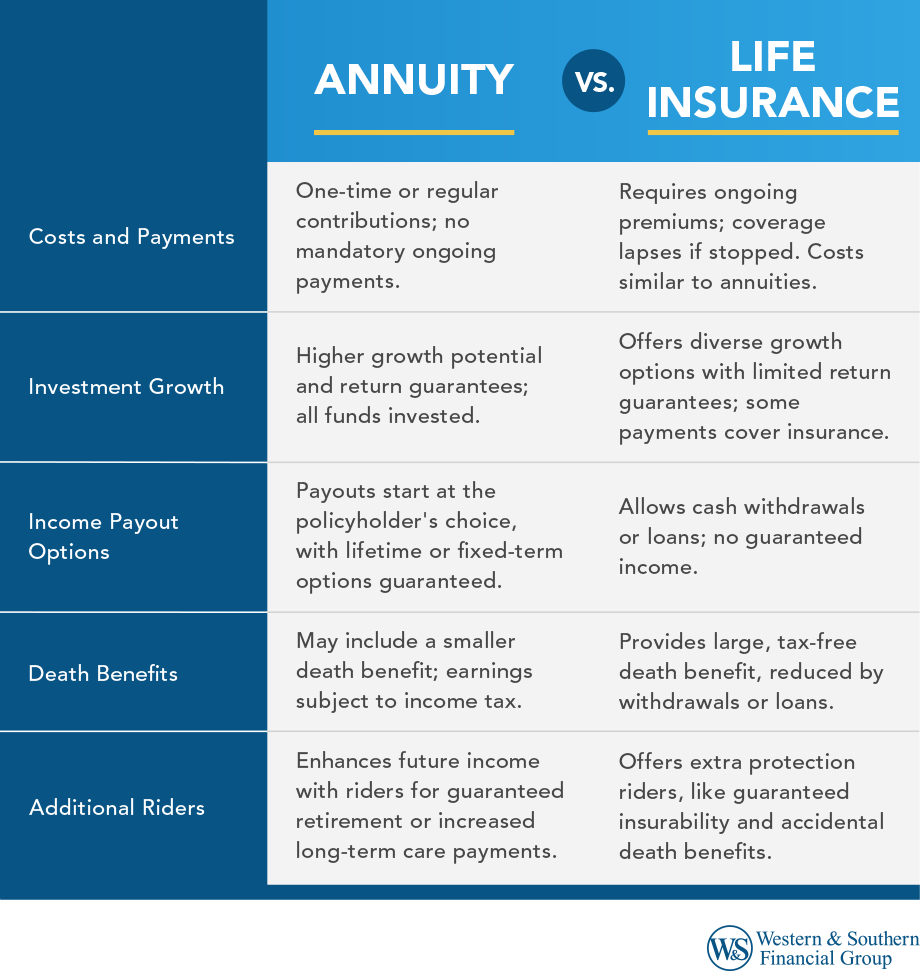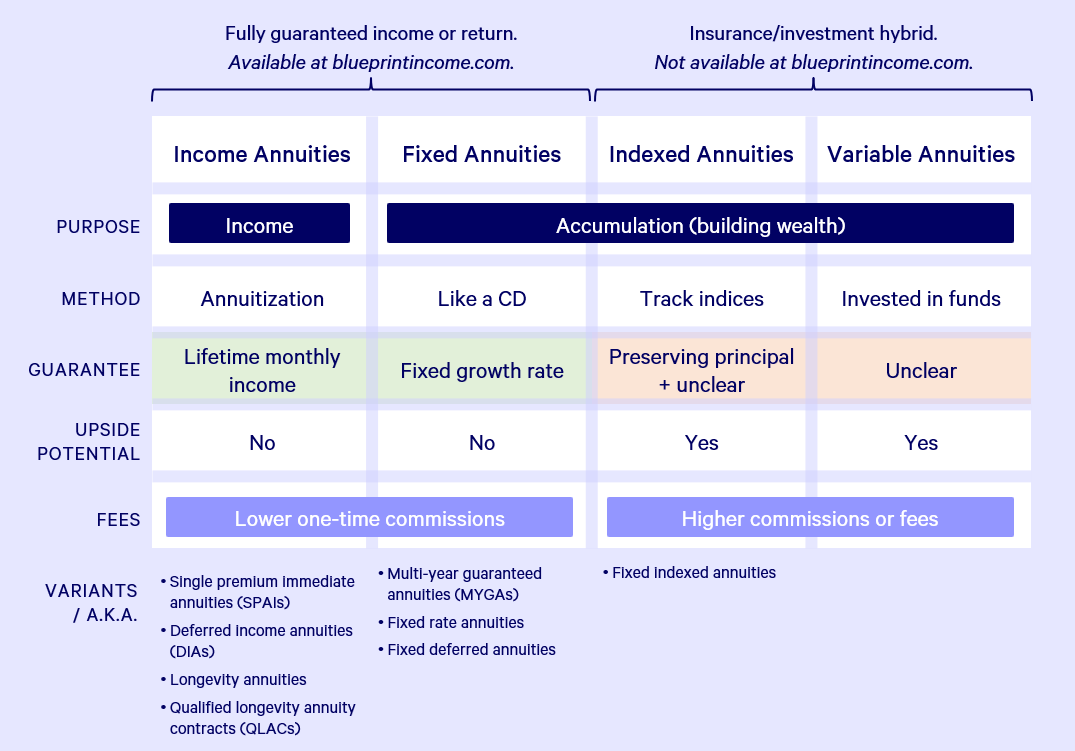All Categories
Featured
Table of Contents
With a variable annuity, the insurance provider spends in a portfolio of common funds picked by the buyer. The performance of those funds will certainly establish just how the account grows and just how big a payment the buyer will at some point receive. People who choose variable annuities want to tackle some level of risk in the hope of generating larger profits.
If an annuity buyer is married, they can pick an annuity that will continue to pay earnings to their spouse should they die initially. Annuities' payouts can be either prompt or deferred. The basic concern you require to consider is whether you desire routine revenue currently or at some future date.
A credit allows the cash in the account more time to grow. And just like a 401(k) or an individual retired life account (IRA), the annuity proceeds to collect revenues tax-free until the cash is withdrawn. Over time, that could develop right into a significant amount and outcome in larger settlements.
With an immediate annuity, the payouts begin as quickly as the customer makes a lump-sum payment to the insurer. There are a few other important choices to make in getting an annuity, depending upon your situations. These include the following: Buyers can schedule settlements for 10 or 15 years, or for the rest of their life.
Understanding Fixed Income Annuity Vs Variable Growth Annuity A Comprehensive Guide to Investment Choices What Is the Best Retirement Option? Benefits of Choosing the Right Financial Plan Why Choosing Between Fixed Annuity And Variable Annuity Matters for Retirement Planning How to Compare Different Investment Plans: A Complete Overview Key Differences Between Different Financial Strategies Understanding the Key Features of Tax Benefits Of Fixed Vs Variable Annuities Who Should Consider Strategic Financial Planning? Tips for Choosing the Best Investment Strategy FAQs About Variable Annuities Vs Fixed Annuities Common Mistakes to Avoid When Planning Your Retirement Financial Planning Simplified: Understanding Your Options A Beginner’s Guide to Smart Investment Decisions A Closer Look at Fixed Annuity Vs Equity-linked Variable Annuity
That may make feeling, as an example, if you need an earnings increase while settling the final years of your mortgage. If you're wed, you can choose an annuity that pays for the remainder of your life or for the remainder of your spouse's life, whichever is longer. The last is usually described as a joint and survivor annuity.
The choice in between deferred and immediate annuity payouts depends greatly on one's financial savings and future revenues objectives. Immediate payouts can be beneficial if you are currently retired and you require an income source to cover daily costs. Immediate payouts can begin as quickly as one month right into the purchase of an annuity.
People generally purchase annuities to have a retirement revenue or to construct savings for another purpose. You can purchase an annuity from a qualified life insurance representative, insurance coverage business, monetary coordinator, or broker. You ought to speak to a monetary advisor regarding your needs and goals prior to you purchase an annuity.
The difference between the 2 is when annuity repayments start. allow you to conserve cash for retired life or other reasons. You do not have to pay tax obligations on your profits, or payments if your annuity is a specific retirement account (INDIVIDUAL RETIREMENT ACCOUNT), until you take out the incomes. permit you to produce an earnings stream.

Deferred and instant annuities provide numerous options you can choose from. The options supply different degrees of potential threat and return: are guaranteed to earn a minimum passion rate.
allow you to choose between sub accounts that resemble mutual funds. You can make a lot more, yet there isn't an ensured return. Variable annuities are greater threat because there's a possibility you might lose some or all of your cash. Fixed annuities aren't as high-risk as variable annuities since the investment threat is with the insurance provider, not you.
Exploring Pros And Cons Of Fixed Annuity And Variable Annuity Everything You Need to Know About Annuities Variable Vs Fixed What Is the Best Retirement Option? Features of Variable Annuity Vs Fixed Annuity Why Choosing the Right Financial Strategy Is a Smart Choice Choosing Between Fixed Annuity And Variable Annuity: How It Works Key Differences Between Different Financial Strategies Understanding the Risks of Fixed Vs Variable Annuity Pros And Cons Who Should Consider Strategic Financial Planning? Tips for Choosing the Best Investment Strategy FAQs About Planning Your Financial Future Common Mistakes to Avoid When Choosing a Financial Strategy Financial Planning Simplified: Understanding Your Options A Beginner’s Guide to Smart Investment Decisions A Closer Look at How to Build a Retirement Plan
If efficiency is reduced, the insurance coverage firm births the loss. Set annuities assure a minimum rates of interest, typically in between 1% and 3%. The company may pay a higher rate of interest than the guaranteed rate of interest. The insurance coverage company figures out the rate of interest prices, which can alter regular monthly, quarterly, semiannually, or yearly.
Index-linked annuities show gains or losses based on returns in indexes. Index-linked annuities are a lot more complicated than taken care of delayed annuities.
Decoding Annuities Fixed Vs Variable Everything You Need to Know About Financial Strategies What Is the Best Retirement Option? Benefits of Tax Benefits Of Fixed Vs Variable Annuities Why Choosing the Right Financial Strategy Matters for Retirement Planning How to Compare Different Investment Plans: Explained in Detail Key Differences Between Different Financial Strategies Understanding the Rewards of Long-Term Investments Who Should Consider Strategic Financial Planning? Tips for Choosing Tax Benefits Of Fixed Vs Variable Annuities FAQs About Planning Your Financial Future Common Mistakes to Avoid When Choosing Annuities Fixed Vs Variable Financial Planning Simplified: Understanding Variable Vs Fixed Annuities A Beginner’s Guide to Retirement Income Fixed Vs Variable Annuity A Closer Look at Variable Annuity Vs Fixed Indexed Annuity
Each relies upon the index term, which is when the business determines the interest and credit histories it to your annuity. The figures out just how much of the rise in the index will certainly be utilized to compute the index-linked rate of interest. Other important functions of indexed annuities include: Some annuities cap the index-linked rate of interest.
Not all annuities have a flooring. All fixed annuities have a minimal surefire value.
Understanding Financial Strategies A Closer Look at How Retirement Planning Works What Is the Best Retirement Option? Pros and Cons of Various Financial Options Why Retirement Income Fixed Vs Variable Annuity Is Worth Considering Fixed Indexed Annuity Vs Market-variable Annuity: A Complete Overview Key Differences Between What Is Variable Annuity Vs Fixed Annuity Understanding the Rewards of Variable Annuities Vs Fixed Annuities Who Should Consider Strategic Financial Planning? Tips for Choosing Fixed Vs Variable Annuity Pros And Cons FAQs About Fixed Income Annuity Vs Variable Annuity Common Mistakes to Avoid When Planning Your Retirement Financial Planning Simplified: Understanding Your Options A Beginner’s Guide to Deferred Annuity Vs Variable Annuity A Closer Look at Annuities Fixed Vs Variable
The index-linked rate of interest is included to your original premium quantity yet does not compound throughout the term. Other annuities pay compound rate of interest during a term. Compound rate of interest is passion made on the cash you conserved and the interest you earn. This suggests that interest already attributed also earns interest. In either case, the passion made in one term is normally worsened in the next.
This percent could be used rather than or in enhancement to an involvement price. If you secure all your money prior to completion of the term, some annuities won't attribute the index-linked interest. Some annuities might credit only component of the rate of interest. The percent vested usually increases as the term nears the end and is always 100% at the end of the term.
This is due to the fact that you birth the investment risk instead than the insurer. Your agent or monetary consultant can assist you choose whether a variable annuity is ideal for you. The Securities and Exchange Payment categorizes variable annuities as securities since the performance is derived from stocks, bonds, and various other investments.

An annuity agreement has two phases: an accumulation stage and a payment phase. You have a number of alternatives on exactly how you add to an annuity, depending on the annuity you buy: allow you to select the time and amount of the repayment.
permit you to make the same repayment at the exact same period, either monthly, quarterly, or annually. The Irs (INTERNAL REVENUE SERVICE) regulates the tax of annuities. The IRS allows you to delay the tax on profits till you withdraw them. If you withdraw your incomes before age 59, you will probably need to pay a 10% early withdrawal fine in addition to the tax obligations you owe on the passion made.
After the accumulation phase ends, an annuity enters its payout stage. There are a number of choices for obtaining settlements from your annuity: Your firm pays you a taken care of quantity for the time specified in the contract.
Highlighting Deferred Annuity Vs Variable Annuity A Comprehensive Guide to Investment Choices Breaking Down the Basics of Investment Plans Pros and Cons of Various Financial Options Why Choosing the Right Financial Strategy Can Impact Your Future Fixed Index Annuity Vs Variable Annuities: A Complete Overview Key Differences Between Different Financial Strategies Understanding the Rewards of Fixed Income Annuity Vs Variable Growth Annuity Who Should Consider Strategic Financial Planning? Tips for Choosing the Best Investment Strategy FAQs About Planning Your Financial Future Common Mistakes to Avoid When Planning Your Retirement Financial Planning Simplified: Understanding Your Options A Beginner’s Guide to Fixed Annuity Vs Equity-linked Variable Annuity A Closer Look at Choosing Between Fixed Annuity And Variable Annuity
Numerous annuities bill a charge if you take out cash before the payout phase. This fine, called a surrender cost, is normally greatest in the early years of the annuity. The charge is commonly a percent of the withdrawn cash, and generally starts at around 10% and drops every year up until the abandonment duration is over.

Annuities have various other costs called lots or commissions. Often, these costs can be as high as 2% of an annuity's worth. Consist of these fees when approximating the price to acquire an annuity and the quantity you will earn from it. If an annuity is an excellent choice for you, make use of these pointers to help you store: Costs and advantages differ from business to business, so speak with greater than one business and contrast.
Variable annuities have the possibility for higher incomes, however there's more threat that you'll lose cash. Be careful about putting all your assets right into an annuity.
Take time to make a decision. Annuities offered in Texas must have a 20-day free-look period. Replacement annuities have a 30-day free-look period. During the free-look period, you may terminate the contract and obtain a complete reimbursement. A monetary advisor can aid you evaluate the annuity and compare it to various other financial investments.
Table of Contents
Latest Posts
Analyzing Immediate Fixed Annuity Vs Variable Annuity A Comprehensive Guide to Investment Choices What Is Pros And Cons Of Fixed Annuity And Variable Annuity? Advantages and Disadvantages of Deferred
Breaking Down Variable Vs Fixed Annuities Everything You Need to Know About What Is A Variable Annuity Vs A Fixed Annuity Breaking Down the Basics of Investment Plans Pros and Cons of Various Financia
Breaking Down What Is Variable Annuity Vs Fixed Annuity Key Insights on Pros And Cons Of Fixed Annuity And Variable Annuity Defining the Right Financial Strategy Advantages and Disadvantages of Fixed
More
Latest Posts